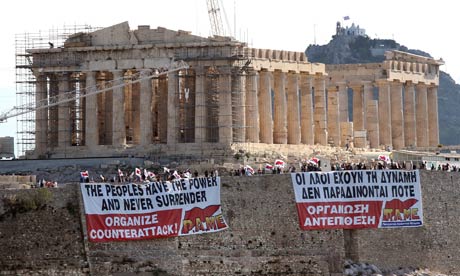Τον Σεπτέμβριο του 2007, δεκατέσσερις μήνες πριν το σχέδιο διάσωσης των Ιρλανδικών τραπεζών, παραιτήθηκα από τη θέση μου ως Εκτιμητής Κινδύνων στην UniCredit Bank Ireland. Το έκανα ώστε να μην ενοχοποιήσω τον εαυτό μου. Έχω περάσει τα τελευταία τρία χρόνια ψάχνοντας για δικαιοσύνη. Τελικά, στις 23 Φεβρουαρίου 2010, είχα την τύχη ο γερουσιαστής David Norris να αναφερθεί στο θέμα στην Ιρλανδική Γερουσία (Seanad Eireann), και να ζητήσει επίσημη απάντηση από τον Υπουργό Οικονομικών, Κο. Brian Lenihan. Ο Γερουσιαστής Norris ολοκλήρωσε την ομιλία του με τα εξής:
"...υπάρχει υπουργική ευθύνη στο θέμα αυτό. Πρόκειται για ένα υπερβολικά σοβαρό θέμα το οποίο έχει καταγγελθεί στην Ρυθμιστική Αρχή. ως αποτέλεσμα, ένας άνθρωπος έχει χάσει τη δουλεία του. Ήταν μια παραίτηση τιμής. Ο βαθμός παραβίασης ήταν 40 φορές παραπάνω από το επιτρεπτό όριο. Αυτό είναι καταστροφικό. Αν δεν είμαστε προετοιμασμένοι να αντιμετωπίσουμε το θέμα και το διερευνήσουμε από τη στιγμή που έχει τεθεί ενωπίων της Βουλής, δεν υπάρχει απολύτως καμία ελπίδα για τη διάσωση του παγκόσμιου οικονομικού συστήματος και της φήμης του.
Έχω κάνει σαφέστατα αιτήματα ως προς την διερεύνηση του θέματος. Πως δύναται η Ρυθμιστική Αρχή να ελέγξει τον ίδιο της τον εαυτό; Πρόκειται για παράβαση ευθύνης. Αυτό είναι το πρώτο θέμα. Το δεύτερο είναι ότι η τράπεζα πρέπει να διωχθεί και να αποκατασταθεί η τιμή του ανθρώπου που συκοφαντήθηκε. Δεν ζητάμε πολλά από το Κοινοβούλιο λέγοντας ότι πρέπει να γίνουν τα παραπάνω. Επιθυμώ η διαδικασία αυτή να ξεκινήσει σήμερα."
http://debates.oireachtas.ie/seanad/2010/02/23/00012.asp
Όσον αφορά την συνέντευξη μου στην ΕΤ3 στην Ελλάδα στις 27 Νοεμβρίου 2012:
"Ο παραιτηθείς Risk Manager της Unicredit Bank (Ireland) Jonathan Sugarman αποκαλύπτει τη πραγματική κατάσταση του τραπεζικού συστήματος στην ελλάδα αλλά και παγκοσμίως, Συγκρίνει την Ελλάδα με την Ιρλανδία ως προς την απέλπιδα προσπάθεια των κυβερνήσεων των δύο χωρών να διασώσουν τις ούτως ή άλλως χρεοκοπημένες τράπεζες, Χαρακτηρίζει την Ελλάδα ώς παράδεισο και καλεί τους έλληνες να παλέψουν για την υπεράσπιση του."
https://www.youtube.com/watch?feature=player_embedded&v=aaaxIcOkw3E
Παρακαλώ κάντε κλικ εδώ για να δείτε τη συνέντευξή μου στο τηλεοπτικό κανάλι ABC στην Αυστραλία:
http://www.abc.net.au/foreign/content/2011/s3367080.htm
My e-mail address: Whistleblower.IRL@gmail.com

